October 16th, 2007 by Susan Atkey | No Comments »
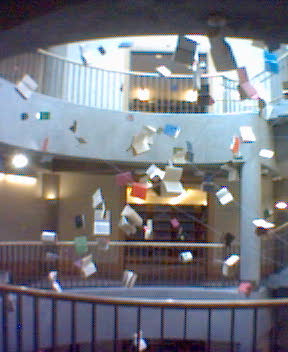
This Thursday, I’ll be teaching a session on tools that you can use to stay up-to-date with research in your field. We’ll look at how you can get the latest Table of Contents for your favourite journals emailed to you, how to get updates on new publications in your area of research, and how to use RSS feeds:
Current Awareness Tools
in the Arts
Thursday, Oct 18, 2:00 – 3:30 pm
Koerner Library : Room 217
Keeping up-to-date in your field of research can be a challenging task. Learn how to set up email alerts or RSS feeds for your favourite databases, journals, or web sites, so that the information comes to you!
Register here:
http://toby.library.ubc.ca/booking/description.cfm?sessionid=4539
——–
(Photo by Sean Durham)
Posted in At the Library, Current Awareness, Workshops and Tutorials | No Comments »
October 15th, 2007 by Susan Atkey | No Comments »
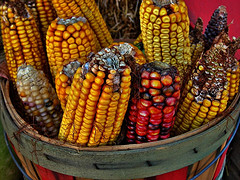
Dr. Michael Blake from the Department of Anthropology gives a talk this Tuesday October 16th at 7:00 p.m at the Museum of Anthropology:
Maize: The Plant that Colonized the World
Teams of scientists using a wide array of new techniques for detecting and studying ancient maize (corn) throughout the Americas are making surprising new discoveries about where, when and how the plant was first domesticated. They are also tracing its journey from 10,000 years ago in south-western Mexico, to the far reaches of South America and the borderlands between Canada and the U.S. By examining some of these new discoveries, ways that maize and humans forged a kind of mutual dependency in the millennia following its domestication will be explored. The ancient adaptability of Maize is reflected in its present-day roles as one of the world’s top three food crops and as a potential source of biofuel—ethanol—moving us through to the 21st century.
For further reading, see:
Histories of maize : multidisciplinary approaches to the prehistory, linguistics, biogeography, domestication, and evolution of maize / edited by John E. Staller, Robert H. Tykot, Bruce F. Benz.
People and plants in ancient western North America / edited by Paul E. Minnis.
The story of corn / Betty Fussell.
——
Photo credit: r-z
Posted in Talks and Seminars | No Comments »
September 26th, 2007 by Susan Atkey | No Comments »
The semester is well under way, and research paper deadlines are quickly approaching. Are you looking for a time-saving tool that can help you track research, save your citations, and even format your bibliography in American Anthropological Association style?

RefWorks, an online citation management tool, can do all those things and more. If you’d like to see how RefWorks can help you with your research process, come to a library workshop on RefWorks this Thursday:
In this hands-on workshop you will create your own personal database in RefWorks, learn how to add references, and use these references when writing a paper, automatically formatting your footnotes and bibliography in the citation style of your choice. The focus is on indexes, databases, and citation styles used by scholars in the Arts.
WHERE and WHEN?
Thursday, September 27
12:00-2:00 pm
Koerner Library : Room 217 (show me a map)
Sign up here.
RefWorks is sponsored by the UBC Library, and available free-of-charge to current UBC faculty, staff, and students.
Posted in At the Library, Electronic Resources, Workshops and Tutorials | No Comments »
September 25th, 2007 by Susan Atkey | No Comments »
The September issue of the Anthropology NEWS Bulletin (No. 2(1): 24 Sept. 2007) is out and available on the Anthropology department website.
As always, it includes a list of new faculty publications, which I’ve replicated below including links to the catalogue record for holdings information or direct links to the online article in those cases where UBC Library subscribes to the ejournal (indicated by the icon:  )
)
Barker, J. 2004 [2007]. “Films and Other Trials: Reflections on Fieldwork among the Maisin, Papua New Guinea,” Pacific Studies 27(3/4): 81- 106.
Barker, J. 2007. Review of “Globalization and the Re-Shaping of Christianity in the Pacific Islands“ edited by Manfred Ernst. The Contemporary Pacific 19(2):624- 26. 
Barker, J. and A. Howard, eds. 2004 [2007]. “Back in the Field Again: Long Term Fieldwork in the Oceanic Anthropology,” Pacific Studies 27(3/4).
J. Barker and A. Howard 2004 [2007]. “Introduction: Back in the Field Again: Long Term Fieldwork in Oceanic Anthropology,” Pacific Studies 27(3/4): 1-10.
Butler, Caroline and Charles Menzies. 2007. “Traditional Ecological Knowledge and Indigenous Tourism.” In R.W. Butler ad T. Hich (eds). Tourism and Indigenous Peoples. London: Elsevier.
Goulet, Jean-Guy and Bruce Granville Miller. Eds. 2007. Extraordinary Anthropology: Transformations in the Field. Lincoln: University of Nebraska Press.
Menzies, Charles and Caroline Butler. 2007. “Returning to Selective Fishing Through Indigenous Fisheries Knowledge: The Example of K’moda, Gitxaala Territory.” American Indian Quarterly. 31:3. 
Miller, Bruce Granville. Ed. Introduction in “Be of Good Mind”. Essays on the Coast Salish. UBC Press, pp.1-29.
Miller, Bruce Granville. 2007. “A Brief Consideration of the Politics of Ecstatic Research.”Quaderni di Tule IV: Proceedings of the XXVI International Congress of Americanists. pp. 405-411.
Pokotylo, David. 2007. “Archaeology and the ‘Educated Public’: A Perspective from the University.” The SAA Archaeological Record 7 (3): 14-18. 
Shelton, Anthony. 2007. “The Collector’s Zeal: Towards an Anthropology of Intentionality, Instrumentality and Desire.” In P. ter Keurs (ed.), Colonial Collections Revisited. CNWS, Leiden pp. 16-44.
Shelton, Anthony 2007. “Intellige Un Credas: The First Canada-China Cultural Exchange Mission.” Muse 25 (2): 12-15, Page 3/2
Shelton, Anthony. 2007. Review of B. Dupaigne, Le Scandale des Arts Premiers. L’Homme 183.
Shelton, Anthony. 2007. Review of O. Kindl, La Jicara Huichola: un microcosmos mesoamericano. L’Homme 182.
Small, Dan and E. Drucker. 2007. “Closed to Reason: Time for Accountability for the International Narcotic Control Board.” Harm Reduction Journal. 4(13): 1-14. 
Posted in Faculty Publications | No Comments »
September 24th, 2007 by Susan Atkey | No Comments »
UBC Library subscribes to hundreds of online resources to support research across the disciplines at UBC. There are several databases that Anthropologists and Archaeologists might choose, depending on the area of focus. The main database for the discipline is Anthropology Plus. Web Of Science’s Social Science Citation Index is strong in archaeology. Graduate students love the fulltext of dissertations available through Proquest Theses and Dissertations.
Until now, there was no way to search all three of these at once. Now you can! Introducing MetaLib, a new search tool that enables you to search multiple databases simultaneously.
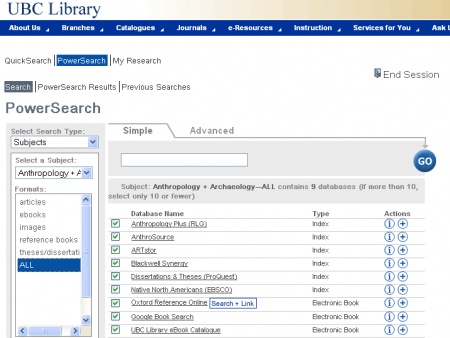
If you’re interested in exploring this tool, come to a library session Introducing MetaLib this Wednesday, September 26 from 1-2pm in Koerner 217. In this session, we’ll give you an overview of MetaLib and show you how you can use it to search across a set of pre-defined databases in a broad area like Newspapers, select databases from a specific specific subject area such as Anthropology and Archaeology, or create your own set of databases to search.
Register for the session here, and try out MetaLib beforehand here.
Posted in At the Library, Electronic Resources, What's New? | No Comments »
August 15th, 2007 by Susan Atkey | No Comments »
Change is afoot at the Library! We’ve recently unveiled a new library home page.
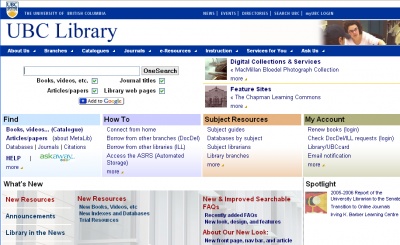
The library website as a whole remains much the same, but the front door has undergone some changes in order to:
- improve general site navigation by decreasing the number of clicks to popular services such as Subject Guides and MyAccount
- offer a single search box called “OneSearch” to provide links to search results for books, articles, journals, library webpages, and library digital collections
- provide access to MetaLib, a new tool which enables you to search across multiple databases simultaneously
- highlight our growing digital collections such as the Japanese Canadian Photograph Collection
- accommodate the common-look-and-feel UBC navigation bar
For more details, see the announcement, and don’t forget to provide feedback!
Posted in At the Library, What's New? | No Comments »
July 16th, 2007 by Susan Atkey | No Comments »

Are you looking for an online tool that can help you track research, save your citations, and then format your bibliography?
RefWorks, an online citation management tool, can do all those things and more.
If you’d like to see how RefWorks can help you with your research process, come to the library workshop on RefWorks this Wednesday.
In this hands-on workshop you will create your own personal database in RefWorks, learn how to add references, and use these references when writing a paper, automatically formatting your footnotes and bibliography in the citation style of your choice. The focus is on indexes, databases, and citation styles used by scholars in the Arts.
WHERE and WHEN?
Wednesday, July 18 from 1:00 – 3:00 PM
Koerner Library : Room 217 (show me a map)
Sign up here.
If you can’t make this session, check the UBC Library instruction calendar for more.
RefWorks is sponsored by the UBC Library, and available free-of-charge to current UBC faculty, staff, and students.
Posted in At the Library | No Comments »
May 2nd, 2007 by Susan Atkey | No Comments »
 (Photo by dullhunk)
(Photo by dullhunk)
Seats are still available for tomorrow’s (free) talk on “Transformative Change in the System of Scholarly Communication & Publishing Worldwide: the Case for Open Access to Research“. The 3-member panel will speak on the following topics:
Dr. John Willinsky – Why the fuss over open access?
Dr. Francis Ouellette – Why are grant funding agencies advocating for open access to research?
Dr. Carl Bergstrom – Eigenfactor.org: A new methodology for evaluating influence rankings of scholarly articles and journals.
The event takes place on Thursday May 3 from 1 p.m. to 4 p.m. at UBC’s Michael Smith Laboratories. To register, please sign up at http://toby.library.ubc.ca/booking/description.cfm?sessionid=3980.
Presented by the BC Research Libraries Group.
Posted in Open Access Publishing | No Comments »
May 1st, 2007 by Susan Atkey | No Comments »
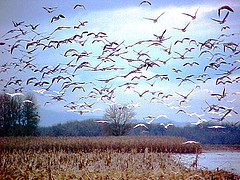
On May 2nd, the RefWorks research tool will be migrating to a Canadian server in response to concerns over privacy of data housed on US servers. (For more information, see this article at University Affairs.)
As a result of the migration, RefWorks users please note the following:
1. RefWorks will be unavailable for most of May 2nd.
2. AFTER May 2nd, log-in access to RefWorks accounts will be from a new URL. If you access RefWorks from a ‘bookmark’ or ‘favourite’, please change your bookmark to this link:
http://refworks.scholarsportal.info
If you access RefWorks from a library webpage, you do not need to make any changes as the links will be changed by the RefWorks administrators.
If you use the RefWorks tools Write-N-Cite, RefGrabit, or RefShare, please read on:
3. Write-N-Cite users will need to download and install the new version of Write-N-Cite from:
http://refworks.scholarsportal.info/Refworks/WNCDownload.asp.
4. RefGrabIt users will need to download and install the new version of RefGrabIt from:
http://refworks.scholarsportal.info/Refworks/BookMarklet.asp.
5. RefShare webpages will still be available, but have new URLs. The new URLS will be available when you log-in to your account after May 2nd. If you currently link to RefShare webpages, their URLs will need to be updated.
If you have questions about the account move, please contact me. For help with RefWorks or RefShare, you can also visit the UBC Library RefWorks website.
Posted in Electronic Resources | No Comments »
April 24th, 2007 by Susan Atkey | No Comments »
Reminder of an upcoming talk this Friday noon:
Music, Culture and Indigenous Thought in Busoga, Uganda: Cultural Survival and Revival at Mpambo, the African Multiversity
A talk by Paulo Wangoola including discussion about field recording by Shawn Hall. The two choirs associated with Mpambo were recorded by Shawn Hall during a visit in 2004 and samples will also be played.
Details:
Friday, April 27th, 2007 from Noon – 1:30pm
Asian Centre, Room 101, UBC
Paulo Wangoola, Nabyama (Founder-President) of the Mpambo Afrikan Multiversity, a recently established and village-based institution of research and higher education dedicated to the revitalization of African Indigenous Thought and Spirituality. The Mpambo campus is located in Isegero, Iganga in Busoga, Eastern Uganda. As part of the work of Mpambo, there is both an Mpambo traditional music and dance group and the Ebanguliro Afrikan Spiritual Choir. A national office is located in Kampala, the capital of Uganda.
For more information visit: http://www.inclusion.com/resmpambo.html or
http://www.blackherbals.com/Mpambo_the_African_Multiversity.htm
Posted in Talks and Seminars | No Comments »






 (Photo by
(Photo by 
